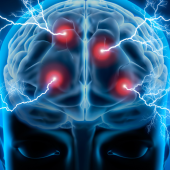Mental health issues were considered an epidemic prior to the onset of the COVID pandemic and there are certainly heightened concerns since its onset. That applies across a broad spectrum of concerns we commonly associate with mental health. Individuals whose disorder was pretty well managed before COVID have been experiencing significantly heightened symptoms. Increasingly practitioners are seeing patients who are really struggling. And some have been prescribed medications that may not be helping at all.
Dr Rouchotas ND spoke to Nutramedica host E Brian Johnson about best practices in treating mental health disorders, including intake, diagnosis, and treatment, as well as direction around prescription interactions.
Key Take-Aways
1. Uptick in mental health issues Mental health issues were considered epidemic prior to the onset of this pandemic and there are certainly heightened concerns since its onset. That applies across a broad spectrum of concerns we commonly associate with mental health including depression, anxiety, as well as other mental health conditions, including OCD, bipolar disorder, and even symptoms of psychosis.
2. Diagnosis of mania Several different manifestations of mania exist, but a hallmark of it is people will go significant stretches without sleeping for two, three, or four days. An easy question to ask is if patients sleep. People do not take offence to this question, and do not even necessarily know it concerns mania or about being bipolar, yet it assists with diagnosis.
3 Intake assessment Critically important is to quantify mental health symptoms when practitioners first see patients, and one where many integrative health care providers miss out. Thorough assessment at intake is a number one priority so as to enable efficient quantification of mental health symptoms
4. Evaluation tools It is always strongly recommended to utilize standardized intake tools. These include validated intake questionnaires, the Hamilton depression rating scale, the Hamilton anxiety index, the Beck depression rating scale, the Beck anxiety index, and the Pittsburgh sleep quality scale. There are literally hundreds of these evaluation tools. Most are available online.
5. Identifying improvement It is important to recognize that patients typically forget what mental state they were in when they first present at the clinic. At week four of treatment, while they may still be experiencing some symptoms, they will see significant improvements if the correct intake tools are used to track those improvements.
6. Natural health product strategies A comprehensive strategy is to use natural health product combinations. High EPA fish oil and Vitamin D are important, and the combination of the herbs St. John's Wort, Valerian, and Passionflower can radically change the outcome for patients' mental health.
7. Gradual migration to natural product treatment For patients with mental health issues,, replacing prescribed SSRIs with natural products must be done VERY gradually. Of critical importance is slowly titrating down the SSRI dose over many weeks in order to avoid negative side effects and relapse.
Key Quote
“I believe that the naturopath should be the frontline in mental health now. The word is getting out that naturopaths can actually be very helpful in these situations, which is why we are seeing more and more individuals presenting with mental health concerns at our clinics.”
Dr Philip Rouchotas
==
The opinions expressed in this Nutramedica program are those of the guests and contributors. They do not necessarily reflect the opinions of Nutritional Fundamentals For Health Inc.
This video is intended for licensed or registered health professionals and students of health professions only. These statements have not been evaluated by the Food and Drug Administration. Information contained in these programs are not intended to diagnose, treat, cure or prevent any disease.



